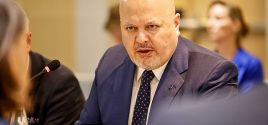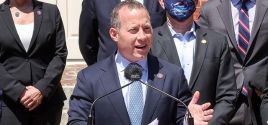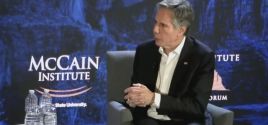Angry Bush tackles terror revoltThe President counters a rebellion by senior Republicans over terror suspects’ treatmentBy Tom Baldwin and Tim Reid The Times Sep. 16, 2006 |
Popular 
Fmr IDF Soldier And Jewish Professor Bravely Intimidate Muslim Women at Pro-Israel Protest

Alan Dershowitz: 'Any University That Divests from Israel Should Have Its Federal Funding Terminated'

'Target Israel And We Will Target You': AIPAC-Funded U.S. Senators Threaten ICC Prosecutor

AIPAC-Funded Congressmen Push for 'October 7th Remembrance Curriculum' to be Taught in Schools

Blinken Blames Social Media for Israel Losing PR War; Romney Agrees, Confirms TikTok Ban is to Help Israel
 GEORGE BUSH came out fighting yesterday against the senior Republicans, including Senator John McCain and General Colin Powell, who have led a revolt over his latest plans for the treatment and trial of terror suspects. He said that if legislative proposals to clarify “vague” obligations under the Geneva Conventions were blocked by the Senate, a CIA interrogation programme that had helped to prevent attacks in both the US and Britain would be scrapped. On occasions during yesterday’s White House press conference, the President appeared to be genuinely angry, interrupting a reporter’s question to shout: “I’m just telling you the bottom line. “Perhaps some in Congress do not think the programme is important . . . I think it’s vital. The point is that the programme is not going to go forward if our professionals do not have clarity within the law.” He raised the spectre of a young intelligence officer being tried for war crimes because he had been given insufficient guidance about what he could do. But this is not the time Mr Bush would have chosen for a confrontation with the likes of Senator McCain or General Colin Powell, his former Secretary of State. He had hoped to present a united front and concentrate the minds of voters on national security in the run-up to November’s mid-term elections. Mr Bush’s announcement last week that 14 high-value al-Qaeda detainees, including Khalid Sheikh Mohammed, the alleged mastermind behind the September 11 attacks, had been transferred from secret CIA prisons to Guantanamo Bay for prosecution, was deliberately timed to galvanise the Republican base. Polls have even showed his rock-bottom approval ratings recovering slightly in the past fortnight. But on Thursday, less than eight weeks before polling day, he ran into a brick wall in the form of the senior Republican Senators such as John Warner, Lindsey Graham and Mr McCain, as well as General Powell. They certainly have more experience — and probably more weight and standing — on matters military than the President. Mr McCain, after all, was tortured after being captured in Vietnam, while General Powell was chairman of the Joint Chiefs of Staff during the Gulf War. Although Mr Bush denied that the CIA had tortured suspects, some of the techniques used in its secret prisons such as “waterboarding”, which simulates drowning, have been condemned by human rights groups. “The world is beginning to doubt the moral basis of our fight against terrorism. To redefine Common Article 3 [of the Geneva conventions] would add to those doubts,” General Powell wrote in a letter to Mr McCain. Yesterday Mr Bush described General Powell’s comments as flawed logic: “It’s unacceptable to think there is any comparison between the behaviour of the USA and the behaviour of terrorists who would kill innocent men, women and children.” Mr McCain said: “We are not saying the CIA cannot carry out a programme. We are saying it cannot amend the Geneva conventions.” He has argued that if the US began reinterpreting the rules, it could set a precedent for other less democratic countries to introduce their own interpretation. This, he said, would put US troops at risk. Mr McCain, the Republican front-runner for the 2008 presidential nomination, is said to have told colleagues that he would rather sacrifice his chances of winning the White House than accept these measures. The Senator also objected to proposals for the prosecution of terror suspects in special military tribunals. A previous scheme was struck down earlier this year by the US Supreme Court, but a revised plan introduced by the Administration would still prevent defendants from seeing intelligence evidence before their trial. Mr McCain and his colleagues believe that the trials should be more like court martials, where defendants have full access to information. |



